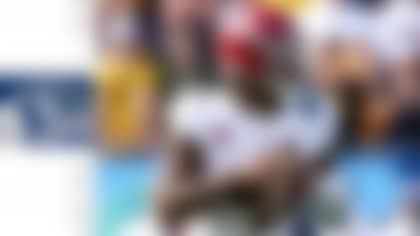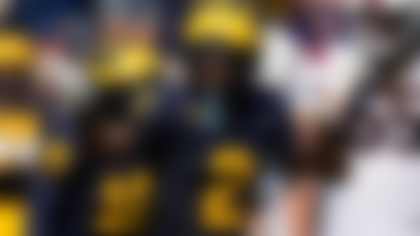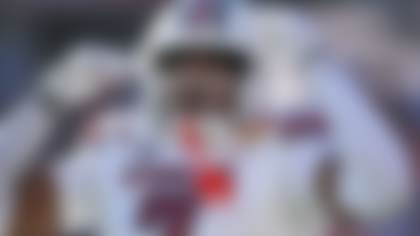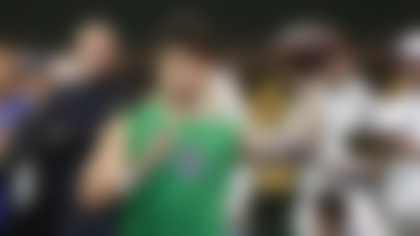Before we turn our full attention to the combine, free agency and the draft, I wanted to take a few minutes to reflect on Super Bowl XLIV before we plunge full on into the 2010 offseason. After re-watching the game and talking to a few people about the game -- including some directly involved -- I thought it necessary to point out what a tremendous job Sean Payton, Gregg Williams and their staff did in helping the Saints pull off the upset over the Colts.
I respect what Colts president Bill Polian had to say about the Saints' superior play on special teams -- and New Orleans did indeed outperform Indianapolis in all facets of special teams -- and his club's struggles along the offensive line as being key factors in the defeat, but that's only a small part of the picture. The bottom line was Jim Caldwell and his staff were outcoached pretty much across the board, and Saints QB Drew Brees outplayed Peyton Manning. That's your ballgame folks. That's the difference.
Much of Payton's superior coaching day have been well chronicled, from throwing the replay flag on the two-point conversion, to the onside kick to start the second half, to the decision to go for it on fourth down at the goal line late in the first half. But that's only a part of the picture. Payton and Williams also changed the entire mindset and culture of that organization, with the Super Bowl win crystallizing their influence in that regard. From the moment they arrived in Florida, Payton kept delivering the same message to his charges, telling them this Super Bowl scenario was a coach's dream come true: "To be the underdogs, but to have the better team." His players used that chip to their advantage, and come Sunday exemplified it.
Payton and Williams both have swashbuckling tendencies -- both can be uber aggressive -- but they knew that against the Colts that kind of mentality can get you blown out. Instead, both gave heed to the words of their coaching friends and/or mentors in approaching the game. Payton could hear the words of Bill Parcells in his head, trying to play a ball-control, keep-away style of game that fueled Parcells' Giants to beating the high-powered Bills in Super Bowl XXV. And Williams could hear the words of good friend Jeff Fisher, the Titans' long-time coach who faces Manning twice a year, ringing in his ears: "Be patient you dumb (expletives deleted)! Be patient!"
The ability of both these men to temper their ways, concoct a stellar game plan and make astute in-game adjustments was at the heart of this victory. The inability of the Colts' staff to counter any of this, and Manning's relative difficulty discerning the many looks and schemes thrown his way, had much to do with their downfall.
Payton was anything but too aggressive in the biggest game of his career. He wasn't out to throw bombs and rely on that quick-strike offense. He held back, remaining balanced in his approach and, if anything, got more conservative than usual. He used a tackle-eligible formation on 10 of New Orleans' 48 snaps through three quarters of the game, playing a power approach against the Colts, who are not a big front and played almost exclusively in a Cover-2 defense in the game, without an extra safety in the box.
It got to the point where Payton was toying with the Colts, calling boots and longer passes out of the heavy formation, and the Colts never adjusted. Also, once Brees found the sweet spots and comfort zone against that Cover 2 following a slow start (maybe due to a little nerves in the first quarter), the Colts had no answer for him. Brees shredded them at will, taking 10- to 15-yard chunks, spraying the ball around as he pleased, and yet the Colts stayed in the Cover-2 shell. It got to the point where it became a major piece of conversation on the Saints' sidelines, with one veteran opining by halftime that if the Colts stayed in that defense Brees might not throw another incomplete pass.
Indeed, after starting the game 3-for-7 in the first quarter, Brees was 29-for-30 for the rest of the game. Yet, again, the Colts never really adapted their approach.
Meantime, New Orleans was constantly mixing coverages against Manning, playing various hybrids of Cover 2 on the back end (often giving a Cover-3 look, but with a safety then shifting to a man-technique, and shuffling personnel up front). Every quarter is something new. In the first quarter, Williams called a 3-4 base defense; it was 4-3 in the second quarter, a mix of both in the third quarter, and in the fourth quarter it was mostly sub packages in the nickel and dime out of a base 3-3. Manning, after a torrid start, did not seem comfortable.
All of the pre-snap movement by the corners and safeties gave him trouble. There were numerous times where he checked into passing plays, thinking there would ultimately be more defenders in the box than there really were. With the early lead, and with Joseph Addai averaging 8.6 yards per attempt in the first half, the Colts could have bludgeoned the smallish Saints on the ground. It was all there for the taking, especially with Williams in a lot of Cover 2. But the Colts didn't go that route, due largely to the deception of the Saints' D.
"We gave them a lot of looks to try to discourage the run, knowing Peyton had those check-with-me's," a Saints source said. "Especially in the second and third quarter, we made them believe we had an extra man in the box, and he couldn't seem to read it was really a two-deep (zone)."
It was a major mistake, as the Saints' playmakers largely reside on the back end of that defense, and we know how huge Tracy Porter's pick six was to the outcome (more on that later). Caldwell, who walked into the perfect situation in Indy and doesn't have to run the offense or defense, also made a tactical error in letting Matt Stover attempt a 51-yard field goal, well out of his range, especially on a breezy night outdoors. He had no chance of making that and hasn't been good outside of 40 yards for a few years now, which is why the Ravens parted with him despite his exceptional career with them. That gave the Saints a short field at the worst possible time for the Colts in the second half.
Williams, despite falling behind early, didn't gamble to get points back. He did overload certain areas of the line at times, but not with reckless blitzes. He stayed patient, indeed. He also allowed middle linebacker Jonathan Vilma freedom to make checks, a la Manning, reversing out of some plays. In all, one person on the Saints' sideline figured Vilma made 30-odd checks in the game, including a crucial one on the third-and-11 play directly preceding Stover's field-goal miss.
Vilma checking into a Cover-2 scheme from a more aggressive look, then, responsible for the slot receiver in the defense, did a stellar job of getting downfield with Austin Collie and breaking up the play, forcing the fourth-down decision. "We won the mental game with Peyton, and Vilma was a big part of the reason why," the Saints source said.
Manning looked just as confused on the decisive play of the game, when his interception was taken back for the game-clinching touchdown. The Saints called the same defense they had just five snaps prior, but this time brought an overload of inside pressure, where before they we bringing it from the outside. Porter knew Manning wouldn't have the time to go deep, and that Reggie Wayne couldn't throw him a double move, or Manning would be on the receiving end of one of those "remember me" shots from the inside pressure. Manning wouldn't be able to step up into his throw, either.
The coaches figured Manning was going to Wayne under this circumstance given he was in the slot, but couldn't get word to Porter. But his film study and prep work served him well. Porter stayed flatfooted on the route, and jumped it underneath. The rest, as they say, is history.
On a day when Brees made no mistakes, Manning made a crucial one (let's table that greatest-ever talk until he gets another ring and is something better than 9-9 in the postseason). On a day when the Colts badly needed to shift momentum or adjust on both sides of the ball, the coaches could not get it done. And the Saints coaches overcame a quick deficit against a favorite that some figured was worthy of a 19-0 season by seemingly having the perfect calls at the most crucial of times.



